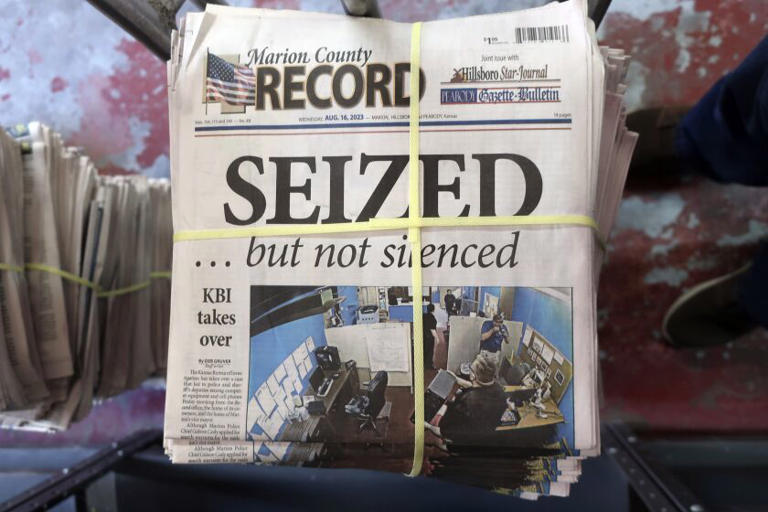The raid on a weekly newspaper in central Kansas was not only illegal, experts said; a former federal prosecutor added: “I’d probably have the FBI starting to look.” He also said that the police chief may have committed a crime by ordering the raid.
Some legal professionals think the Aug. 11 raid on the Marion County Record’s offices and publisher’s residence violated a federal privacy regulation that forbids newsroom searches of journalists. Some contend that it was against a Kansas statute that makes it more challenging to compel journalists and editors to reveal their sources or unpublished material.
The raid’s justifications, according to Marion Police Chief Gideon Cody, are a topic of discussion. Police may have been looking for evidence, according to a warrant, that the Record’s personnel violated state statutes against identity theft and computer crimes when they checked information about a nearby restaurant owner. However, the police also took the reporter’s personal cellphone and computer tower that they had used to research Cody’s background.
The newspaper and the 1,900-person town were thrust into the forefront of a discussion over press liberties as a result of the raid. The newspaper’s robust coverage of local politics and boiling disagreements have been made public by recent occurrences. However, it also brought Cody, who had only been working there for three months, into sharp focus.
The Kansas Bureau of inquiry is now in charge of the ongoing inquiry into whether the newspaper violated any state laws. State Attorney General Kris Kobach has stated that he does not believe the KBI’s mission is to look into the actions of the police, which has led some to wonder whether the federal government will get involved. The FBI and the US Department of Justice’s spokespeople declined to comment.
The raid exposed Cody, the city, and others to lawsuits for potential civil rights violations, according to Stephen McAllister, a U.S. attorney for Kansas under the Trump administration. Furthermore, he continued, “We also have some exposure to federal criminal prosecution.”
Computers, individual smartphones, and a router from the publication were seized by police. After the local prosecutor determined there wasn’t enough evidence to support their seizure, all items were released to a computer forensics auditing company hired by the newspaper’s counsel on Wednesday. The company is looking into whether files were copied or accessed.
The Record, located roughly 150 miles southwest of Kansas City, Missouri, is renowned for its robust coverage of regional politics and its neighborhood. Following the raid, it received a flood of support from various media outlets and news organizations, and Editor and Publisher Eric Meyer announced on Friday that it had added 4,000 new subscribers, more than enough to double the size of its press run, even if many of the new subscriptions are digital.
But there were those locals who supported the raids. Jared Smith thinks the newspaper is excessively critical and attributes the failure of his wife’s day spa on the coverage of the story.
I really want to see the paper fall, he said.
Kari Newell also stated of the newspaper, “They do twist and contort — misquote individuals in our community — all the time.” Kari Newell’s complaints that the newspaper breached her privacy were listed as justifications for the raid.
Meyer denies criticism of the reporting in his publication and claims that those who object are angered because it tries to hold local leaders accountable. And he attributes the stress of the raid to his mother Joan Meyer’s passing on August 12 at the age of 98. Joan Meyer was a co-owner of the newspaper.
According to Meyer, the newspaper received anonymous reports on “a variety of tales” about why Cody left a Kansas City position paying $115,848 a year to take a job paying $60,000, per a sister publication, after the mayor offered him the police chief’s position in late April. Meyer claimed that the newspaper was unable to satisfactorily verify the tips.
When Meyer approached Cody directly about the tips he had received, Cody reportedly responded: “If you print that, I will sue you.” Days later, on May 30, Cody was sworn in as the new police chief.
“We get private information from people all the time, and we check it out,” said Doug Anstaett, a former executive director of the Kansas Press Association. And occasionally we recognize their absurdity, but most of the time when we receive a tip, we investigate. That is precisely what they are doing.
Anstaett asserted that he thinks the newspaper ought to have been protected under the state’s shield law for journalists, passed in 2010 by the Republican-controlled Legislature. Law enforcement organizations are permitted to request subpoenas from news organizations in order to get confidential material, but they must first demonstrate that they have a compelling reason to do so and that they have exhausted all other options.
Derek Schmidt, a Republican state senator and former Kansas attorney general, said the shield law does not allow for police enforcement to obtain information without first going to court and obtaining a subpoena. Nevertheless, he continued, “The spirit of the law is that it should be broadly applied.”
Before the Marion raid, Jeffrey Jackson, the acting dean of Washburn University’s law school in Topeka, told his students that a police search of a newspaper “really just never happens.” He recently finished teaching a summer constitutional law course that addressed press freedoms and the federal privacy law.
Jackson claimed that Cody’s motivations—including whether he was looking for sources—would determine whether the raid broke the state’s shield statute. But even if Cody was looking for proof of a crime committed by newspaper employees, Jackson thinks he probably broke the federal privacy legislation because it, like the state law, allows for a subpoena to be issued to a police enforcement agency.
Jackson stated that “either they broke the shield law or they most likely broke the federal law.” “It’s a mess, either way,”
